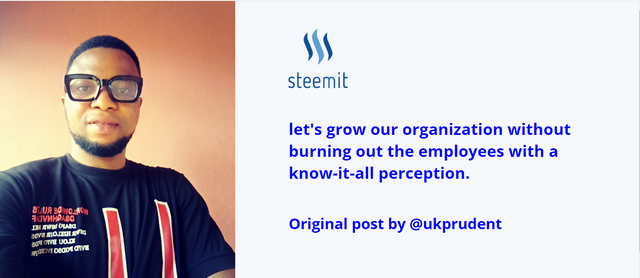You don't need to know everything as an employee in an organization.

You don't need to know everything as an employee in the organization, instead focus on your primary skills and stay abreast of new trends for relevance and adaptability.
In this modern day workplace, the expectation that an employee should be a know-it-all is not only unrealistic but also counterproductive. The belief that one must be an expert in every facet of their job and beyond can lead to unnecessary stress, burnout, and a decline in overall productivity. Instead, employees should focus on mastering their core responsibilities, leveraging the collective knowledge of their team, and continuously learning in a manageable and strategic manner.
The myth that an employee must know everything stems from an outdated perspective on work. Historically, expertise was often equated with an exhaustive understanding of every aspect of one’s role. However, as workplaces evolve, the sheer volume of information and the complexity of tasks have made this approach impracticable.
No single person can reasonably keep up with the ever-expanding body of knowledge within their field, let alone adjacent ones. Attempting to do so can lead to information overload, where the quality of work suffers because the employee is spread too thin.
Instead of striving to know everything, employees should focus on mastering their core competencies , the specific skills and knowledge that are central to their role. This allows them to perform their primary tasks with excellence, thereby contributing more effectively to the organization’s goals.
For example, a software developer like myself should prioritize staying updated on coding languages , libraries and development tools over trying to understand the intricacies of project management or marketing strategies. By focusing on their core responsibilities, employees can deliver higher quality work and drive better results.
One of the greatest assets in an organization is the collective knowledge of its team. Collaboration and communication are key in leveraging this resource. When employees work together, sharing insights and expertise, they can solve problems more efficiently and innovate more effectively.
No one needs to be an expert in everything when they can rely on the diverse strengths of their colleagues. Encouraging a culture of collaboration, where team members are comfortable asking for help and sharing knowledge can significantly enhance organizational performance.
While it is unnecessary to know everything, continuous learning remains crucial. The key is to approach learning strategically. Employees should identify areas where additional knowledge will enhance their performance and contribute to their professional growth.
This might involve staying updated with industry trends, learning new tools that can improve efficiency, or developing soft skills that enhance teamwork and communication. By focusing on relevant, incremental learning, employees can remain adaptable and valuable without overwhelming themselves.
Therefore, Leaders should set realistic expectations and recognize the value of specialization. They should foster an environment where continuous learning is encouraged, while striving towards attaining the overall goal of the organization.

Thanks so much @dobartim